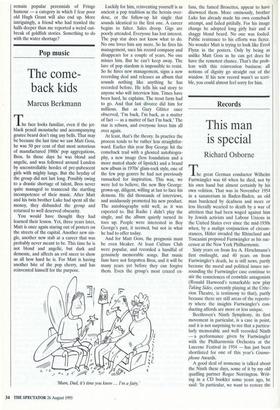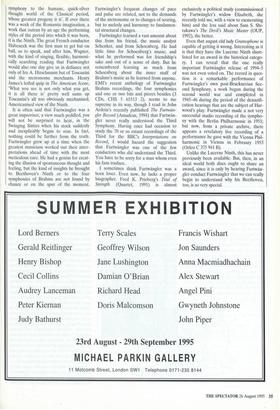Records
This man is special
Richard Osborne
The great German conductor Wilhelm Furtwangler was 68 when he died, not by his own hand but almost certainly by his own volition. That was in November 1954 in a sanatorium in Baden-Baden, an old man burdened by deafness and more or less literally wearied to death by a war of attrition that had been waged against him by Jewish activists and Labour Unions in the United States ever since the mid-1930s when, by a malign conjunction of circum- stances, Hitler invaded the Rhineland and Toscanini proposed Furtwangler as his suc- cessor at the New York Philharmonic.
Sixty years on from Ira A. Hirschmann's first onslaught, and 40 years on from Furtwangler's death, he is still news, partly because the moral and political issues sur- rounding the Furtwangler case continue to stir the consciences of erstwhile antagonists (Ronald Harwood's remarkable new play Taking Sides, currently playing at the Crite- rion Theatre, is testimony to that), partly because there are still areas of the reperto- ry where the insights Furtwangler's con- ducting affords are more or less unique.
Beethoven's Ninth Symphony, its first movement in particular, is a case in point, and it is not surprising to see that a particu- larly memorable and well recorded Ninth — a performance given by Furtwangler with the Philharmonia Orchestra at the Lucerne Festival in 1954 — has just been shortlisted for one of this year's Gramo- phone Awards.
A good deal of nonsense is talked about the Ninth these days, some of it by my old quaffing partner Roger Norrington. Writ- ing in a CD booklet some years ago, he said: 'In particular, we want to restore the Symphony to the humane, quick-silver thought world of the Classical period, whose greatest progeny it is'. If ever there was a work of the Romantic imagination, a work that outran by an age the performing styles of the period into which it was born, it is the Ninth. The great French conductor Habeneck was the first man to get bat on ball, so to speak, and after him, Wagner, with the kind of singing, flexible, harmoni- catty searching reading that Furtwangler would also one day give us in defiance not only of Ira A. Hirschmann but of Toscanini and the metronome merchants. Henry James's lethal quip in The American Scene, 'What you see is not only what you get, it is all there is' pretty well sums up Toscanini's all too obviously mechanised, Americanised view of the Ninth.
It is often said that Furtwangler was a great improviser, a view much peddled, you will not be surprised to hear, in the Swinging Sixties when his stock suddenly and inexplicably began to soar. In fact, nothing could be further from the truth. Furtwangler grew up at a time when the greatest musicians worked out their inter- pretations ahead of time with the most meticulous care. He had a genius for creat- ing the illusion of spontaneous thought and feeling, but the kind of insights he brought to Beethoven's Ninth or to the four symphonies of Brahms are not found by chance or on the spur of the moment. Furtwangler's frequent changes of pace and pulse are related, not to the demands of the metronome or to changes of scoring, but to melody and harmony: to fundamen- tal structural changes.
Furtwangler learned a vast amount about this from his friend, the music analyst Schenker, and from Schoenberg. He had little time for Schoenberg's music; and what he performed was for friendship's sake and out of a sense of duty. But he remembered learning as much from Schoenberg about the inner stuff of Brahms's music as he learned from anyone. EMI's recent anthology of Furtwangler Brahms recordings, the four symphonies and one or two bits and pieces besides (3 CDs, CHS 5 65513 2), seems to me supreme in its way, though I read in John Ardoin's recently published The Furtwein- gler Record (Amadeus, 1994) that Furtwan- gler never really understood the Third Symphony. Having once had occasion to study the 70 or so extant recordings of the Third for the BBC's Interpretations on Record, I would hazard the suggestion that Furtwangler was one of the few conductors who did understand the Third. You have to be sorry for a man whom even his fans traduce.
I sometimes think Furtwangler was a born loser. Even now, he lacks a proper biographer. Fred K. Prieberg's Trial of Strength (Quartet, 1991) is almost exclusively a political study (commissioned by Furtwiingler's widow Elisabeth, she recently told me, with a view to exonerating him) and the less said about Sam S. Shi- rakawa's The Devil's Music Master (OUP, 1992), the better.
Even that august old lady Gramophone is capable of getting it wrong. Interesting as it is that they have the Lucerne Ninth short- listed for an award in the historical catego- ry, I can reveal that the one really important Furtwangler release of 1994-5 was not even voted on. The record in ques- tion is a remarkable performance of Furtwangler's own post-Brucknerian Sec- ond Symphony, a work begun during the second world war and completed in 1945-46 during the period of the denazifi- cation hearings that are the subject of Har- wood's play. Furtwangler made a not very successful studio recording of the sympho- ny with the Berlin Philharmonic in 1951; but now, from a private archive, there appears a revelatory live recording of a performance he gave with the Vienna Phil- harmonic in Vienna in February 1953 (Orfeo C 375 941 B).
Unlike the Lucerne Ninth, this has never previously been available. But, then, in an ideal world both discs ought to share an award, since it is only by hearing Furtwan- gler conduct Furtwangler that we can really begin to understand why his Beethoven, too, is so very special.



















































 Previous page
Previous page